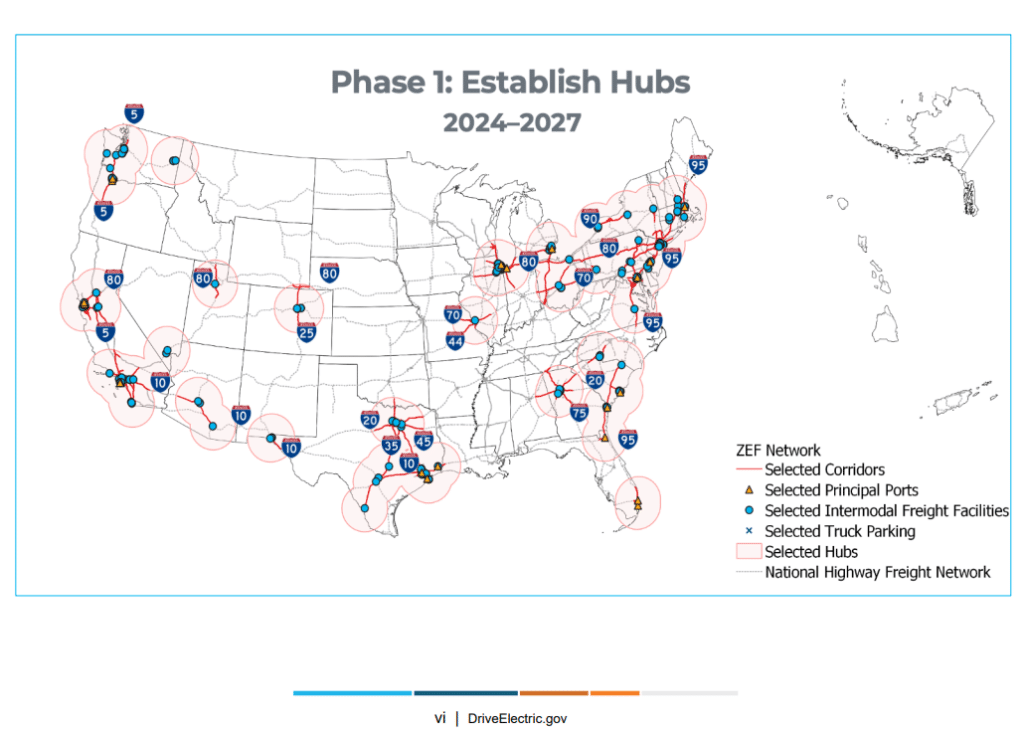Joint Office Electric Vehicle Working Group Meetings Open to Public
The Joint Office has made significant progress in advancing electric vehicle (EV) charging infrastructure and adoption across the United States. The formation of the Electric Vehicle Working Group (EVWG) by the Joint Office of Energy and Transportation (Joint Office) marks a pivotal move towards integrating light-, medium-, and heavy-duty electric vehicles into the nation’s transportation and energy ecosystems. This collaborative effort is focused on making informed recommendations to the Secretaries of Energy and Transportation, thereby shaping the future of EV technology and infrastructure development.
April 2024 Meetings
Don’t miss the opportunity to be a part of this initiative by registering for the upcoming in-person EVWG meeting. Scheduled for Tuesday, April 2, from 9:30 a.m. to 4 p.m. Eastern and Wednesday, April 3, from 8:30 a.m. to 2:30 p.m. Eastern, this event promises insightful deliberations on the new Zero-Emission Freight Strategy and other critical topics concerning electric vehicles. Whether attending virtually or in person, participants can expect a comprehensive agenda featuring a review and vote on the EVWG’s inaugural report, updates from various subcommittees, and a series of technical presentations aimed at driving forward EV adoption and infrastructure. Secure your spot to contribute to and stay informed about the future of electric transportation by registering here, or explore previous meeting recordings to catch up on the EVWG’s progress.
EVWG Mission and Objectives
The activities of the EVWG are critical in shaping the landscape of electric vehicle (EV) integration within the United States. Their responsibilities extend across several key areas:
Providing Recommendations: The EVWG is tasked with offering strategic counsel on the development, adoption, and systemic integration of light-, medium-, and heavy-duty EVs. This guidance is aimed at ensuring a coordinated approach to enhancing the United States’ transportation and energy systems.
Coordination and Consultation: A significant role of the EVWG involves liaising with existing federal interagency working groups. Their collaborative efforts focus primarily on the conversion of fleets to electric vehicles and addressing other related concerns, thereby fostering a unified approach to EV integration.
Reporting Responsibilities: The EVWG reports its findings and recommendations to authoritative bodies such as the Secretaries of Energy and Transportation, and committees within both the Senate and the House. These reports cover a wide range of topics including, but not limited to:
Barriers and Opportunities: An assessment of the hurdles and prospects associated with scaling up EV adoption across the nation.
Success Stories: A comprehensive review of effective public and private initiatives, demonstration projects, and models that have significantly contributed to promoting EV adoption.
Barrier Analysis: An in-depth analysis of ongoing efforts aimed at overcoming challenges to EV implementation.
Cost-Benefit Analysis: An evaluation of the projected costs and benefits associated with the EVWG’s recommendations, ensuring informed decision-making.
Additional Topics: The exploration of other relevant subjects as determined by the criteria set forth in section 25006 (c)(1) of the Bipartisan Infrastructure Law.
These activities collectively support the EVWG’s mission to accelerate the transition to electric vehicles, thereby contributing to a sustainable and efficient transportation ecosystem in the United States.
Strategy to Accelerate Zero-Emission Freight Infrastructure Deployment
Following the efforts to promote electric vehicles, the National Zero-Emission Freight Corridor Strategy has been released. This ambitious strategy was crafted by the Joint Office of Energy and Transportation, in close cooperation with the U.S. Department of Energy (DOE), U.S. Department of Transportation (DOT), and the Environmental Protection Agency (EPA). The strategy’s primary aim is to spearhead the establishment of a world-class, zero-emission freight network across the United States by the year 2040.

Central to this strategy is the focus on the rapid deployment of zero-emission infrastructure for medium and heavy-duty vehicles (ZE-MHDV). By strategically directing public investments, the initiative seeks to significantly bolster the momentum within the private sector. This approach is designed to streamline utility and regulatory planning processes, synchronize industry efforts, and engage communities in the pursuit of clean transportation solutions. The National Zero-Emission Freight Corridor Strategy represents a comprehensive and actionable vision that promises to transform the U.S. freight industry into a global leader in sustainability and efficiency.
New RFI For Feedback From Consumers, Local Governments on Potential Update to EV Charging Standards
The U.S. Department of Transportation’s Federal Highway Administration (FHWA) has launched a Request for Information (RFI) aimed at modernizing the existing benchmarks for EV charging stations. This initiative comes in response to the introduction of the J3400™ standard by the Society of Automotive Engineers (SAE), a groundbreaking guideline for EV charging that incorporates the Tesla-developed North America Charging Standard (NACS) connector. This connector is set to become widely adopted by a vast majority of automakers starting in 2025.
The RFI, a collaborative effort by the Joint Office of Energy and Transportation, the FHWA, and the U.S. Department of Energy, is focused on gathering comprehensive feedback from various stakeholders. Key areas of inquiry include the anticipated market readiness of J3400 within EVs and EV chargers, the standard’s technical congruence with current regulations, and the practical implications of adopting J3400 at charging facilities. Additionally, the RFI seeks insights into the demand for maintaining the availability of both the Combined Charging System (CCS) and J1772 connectors amidst this transition. Furthermore, it explores the feasibility of establishing performance-based standards designed to minimize the need for regulatory revisions as charging technology continues to evolve.
February 2024 NEVI Update
The Joint Office administers the National Electric Vehicle Infrastructure (NEVI) Formula Program. In February, the Joint Office released a Q1 2024 NEVI update. The update stated that thirty-three states have stepped forward with solicitations to the NEVI program, and 16 of them have already started the groundbreaking work of awarding contracts and setting up new public EV charging stations using federal NEVI funding. EV expert Loren McDonald spoke about the update:
“In addition to the NEVI progress in Q1, overall 16 states have announced funding of an estimated $231,275,890 and 343 charging stations (sites). This should result in approximately 1,550 NEVI-funded DC fast charging ports (connections able to charge an individual EV concurrently at the NEVI minimum of 150 kW) being open to EV drivers by early to mid 2025,” according to Loren McDonald, CEO, EVAdoption, LLC.
“For context, in January 2024, roughly 870 new DC fast charging ports opened in the US, or about one-half of the number of NEVI-funded ports that will open over the next 12+ months. The key benefits of the NEVI-funded sites is not in the sheer numbers, but rather the locations they will be at which tend to be lower-utilization highway corridor areas that the charging networks are currently not serving, combined with the minimum of four chargers and reliability accountability with a minimum 97% uptime,” added McDonald.
EVAdoption.com Offers Comprehensive Information
Offering detailed information regarding the NEVI programs, RFP/grant process deadlines, and award winners across all states, Loren McDonald’s EVAdoption is the go-to, comprehensive NEVI resource. With the company’s NEVI: Basic + Dates subscription, you’ll receive regular email updates pointing out imminent deadlines, ensuring you’re always informed. EVAdoption has meticulously constructed a National Electric Vehicle Infrastructure (NEVI) plan, RFI, RFP, events/webinars, and awards database, encompassing all 50 states, plus the District of Columbia and Puerto Rico.

